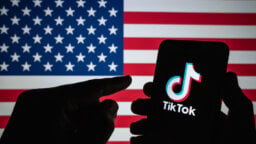TikTok’s CEO has come out fighting after President Joe Biden signed into law a bill that requires ByteDance to divest its holdings in TikTok, or face an effective ban of the app in the US.
“Rest assured, we aren’t going anywhere,” Shou Zi Chew said in a video posted to TikTok on Wednesday (April 24).
Chew said TikTok would fight the “unconstitutional” law in the courts, and “while we make our case in court, you’ll still be able to enjoy TikTok like you always have.”
President Joe Biden signed the divest-or-ban provision – part of a larger national security bill that includes $94 billion in foreign and military aid for Israel, Taiwan and Ukraine – into law on Wednesday, less than a day after the Senate voted 79-18 in favor of the measure, reflecting broad bipartisan support in the upper chamber of Congress.
“The path to my desk was a difficult path. It should have been easier and it should’ve gotten there sooner,” Biden said after signing the bill, as quoted by CNBC.
The president was referring primarily to opposition to the foreign aid part of the bill. A large part of the Republican majority in the House of Representatives opposed further aid for Ukraine, while some House Democrats opposed support for Israel amid its war with Hamas.
“But in the end we did what America always does, we rose to the moment,” Biden added.
By CNN’s calculations, the signing of the bill into law means that China-based tech giant ByteDance has until January 19, 2025 to sell TikTok, as the law gives the company 270 days to find a buyer. However, the president has the option to extend the deadline by 90 days if there is evidence that a sale process is underway.
In his video Wednesday, Chew gave no indication that TikTok or ByteDance plan to comply with the law.
“Make no mistake, this is a ban. A ban on TikTok and a ban on you and your voice,” Chew said, echoing a point that TikTok has been making since the law was first tabled in the House in March.
“Politicians may say otherwise, but don’t get confused. Many who sponsored the bill admit a TikTok ban is the ultimate goal,” Chew added.
TikTok has been at the heart of controversy over its Chinese ownership for years, with many lawmakers expressing concern that the app could allow the government in Beijing to access information on users in the US or allied countries at a time when tensions are rising between China and Western nations. Others have expressed concerns that Beijing could use the app to manipulate public opinion, including during elections.
TikTok has repeatedly and vehemently denied the allegations. In front of Congress earlier this year, Chew said US users’ data is stored on Oracle servers in the United States.
“Through our US data security efforts, we have built safeguards that no other peer company has made,” Chew said in the video. “We have invested billions of dollars to secure your data and keep our platform free from outside manipulation.”
“Politicians may say otherwise, but don’t get confused. Many who sponsored the bill admit a TikTok ban is the ultimate goal.”
Shou Zi Chew, TikTok
Some constitutional experts have said that TikTok has a reasonable chance of overturning the law on First Amendment (freedom of expression) grounds.
“There is the question of the interest of users and of business users of TikTok in speech on the platform and speaking in the platform,” said Elettra Bietti, an assistant professor of law and computer science at Northeastern University. “They could probably bring a lawsuit against this government bill based on the fact that their speech interests are undermined.”
TikTok itself could plausibly make such an argument as well. Since the Supreme Court’s ruling in Citizens United v. FEC, “the US….has recognized that corporations have free speech rights. Obviously, these rights are slightly different than the rights of individuals, but there are still things that the First Amendment protects,” Bietti added.
“In my view, this loaded gun is a ban in all but name, and banning TikTok is obviously unconstitutional,” said Ramya Krishnan, a staff attorney at the Knight First Amendment Institute at Columbia University, as quoted by Vox. “This ban on TikTok is materially the same [as the Montana ban] in all the ways that matter.”
“The US… has recognized that corporations have free speech rights.”
Elettra Bietti, Northeastern University
Montana last year became the first US state to bring in a law banning TikTok. That law was successfully challenged on First Amendement grounds by both TikTok and a group of TikTok users in the state, and courts have blocked enforcement of the law.
However, the lawmakers behind the bill argue the law differs from previous failed attempts to ban the app by giving ByteDance an option between TikTok being removed from US app stores and selling the app to an owner that is not from an “adversary country.”
New Jersey Democratic Rep. Frank Pallone compared the bill to legislation from the 20th century that limited foreign ownership of broadcast airwaves over national security concerns.
“It is no different here, and I take the concerns raised by the intelligence community very seriously,” Rep. Pallone said, as quoted by Vox.
TikTok has previously said that around 7 million businesses in the US rely on the short video platform, and that it contributes $24 billion in economic activity to the US economy annually.Music Business Worldwide





